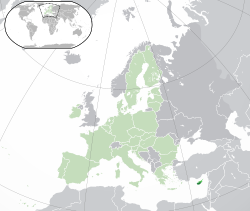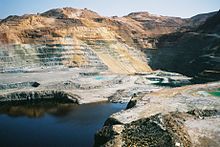Cyprus
Republic of Cyprus | |
|---|---|
 Location of Cyprus (pictured lower right), showing the Republic of Cyprus in darker green and the self-declared republic of Northern Cyprus in brighter green, with the rest of the European Union shown in faded green | |
| Capital and largest city | Nicosia 35°10′N 33°22′E / 35.167°N 33.367°E |
| Official languages | |
| Minority languages | |
| Vernaculars | |
| Ethnic groups | |
| Religion (2020; including Northern Cyprus) |
|
| Demonym(s) | Cypriot |
| Government | Unitary presidential constitutional republic |
| Nicos Anastasiades | |
| Vacant[b] | |
• President of the House of Representatives | Annita Demetriou |
| Legislature | House of Representatives |
| Independence from the United Kingdom | |
| 19 February 1959 | |
• Independence proclaimed | 16 August 1960 |
| 1 October 1960 | |
• Joined the EU | 1 May 2004 |
| Area | |
• Total[c] | 9,251 km2 (3,572 sq mi) (162nd) |
• Water (%) | 9 |
| Population | |
• 2018 estimate | 1,189,265[c][5][6] (158th) |
• 2011 census | 838,897[d][7] |
• Density | 123.4[c][8]/km2 (319.6/sq mi) (82nd) |
| GDP (PPP) | 2019 estimate |
• Total | $35.970 billion[9] (126th) |
• Per capita | $41,572[9] (35th) |
| GDP (nominal) | 2019 estimate |
• Total | $24.996 billion[9] (114th) |
• Per capita | $28,888[9] (33rd) |
| Gini (2019) | medium |
| HDI (2019) | very high · 33rd |
| Currency | Euro (€) (EUR) |
| Time zone | UTC+2 (EET) |
• Summer (DST) | UTC+3 (EEST) |
| Driving side | left |
| Calling code | +357 |
| ISO 3166 code | CY |
| Internet TLD | .cy[e] |
Cyprus[f] (/ˈsaɪprəs/ (![]() listen)), officially called the Republic of Cyprus,[g] is an island nation in the eastern Mediterranean Sea. It is the third largest and third most populous island in the Mediterranean,[12][13] and is located south of Turkey; west of Syria; northwest of Lebanon, Israel and the Gaza Strip; north of Egypt; and southeast of Greece. Nicosia is the country's capital and largest city.
listen)), officially called the Republic of Cyprus,[g] is an island nation in the eastern Mediterranean Sea. It is the third largest and third most populous island in the Mediterranean,[12][13] and is located south of Turkey; west of Syria; northwest of Lebanon, Israel and the Gaza Strip; north of Egypt; and southeast of Greece. Nicosia is the country's capital and largest city.
The earliest known human activity on the island dates to around the 10th millennium BC. Archaeological remains from this period include the well-preserved Neolithic village of Khirokitia, and Cyprus is home to some of the oldest water wells in the world.[14] Cyprus was settled by Mycenaean Greeks in two waves in the 2nd millennium BC. As a strategic location in the Eastern Mediterranean, it was subsequently occupied by several major powers, including the empires of the Assyrians, Egyptians and Persians, from whom the island was seized in 333 BC by Alexander the Great. Subsequent rule by Ptolemaic Egypt, the Classical and Eastern Roman Empire, Arab caliphates for a short period, the French Lusignan dynasty and the Venetians was followed by over three centuries of Ottoman rule between 1571 and 1878 (de jure until 1914).[15]
Cyprus was placed under the UK's administration based on the Cyprus Convention in 1878 and was formally annexed by the UK in 1914. The future of the island became a matter of disagreement between the two prominent ethnic communities, Greek Cypriots, who made up 77% of the population in 1960, and Turkish Cypriots, who made up 18% of the population. From the 19th century onwards, the Greek Cypriot population pursued enosis, union with Greece, which became a Greek national policy in the 1950s.[16][17] The Turkish Cypriot population initially advocated the continuation of the British rule, then demanded the annexation of the island to Turkey, and in the 1950s, together with Turkey, established a policy of taksim, the partition of Cyprus and the creation of a Turkish polity in the north.[18] Following nationalist violence in the 1950s, Cyprus was granted independence in 1960.[19] The crisis of 1963–64 brought further intercommunal violence between the two communities, displaced more than 25,000 Turkish Cypriots into enclaves[20]:56–59[21] and brought the end of Turkish Cypriot representation in the republic. On 15 July 1974, a coup d'état was staged by Greek Cypriot nationalists[22][23] and elements of the Greek military junta[24] in an attempt at enosis. This action precipitated the Turkish invasion of Cyprus on 20 July,[25] which led to the capture of the present-day territory of Northern Cyprus and the displacement of over 150,000 Greek Cypriots[26][27] and 50,000 Turkish Cypriots.[28] A separate Turkish Cypriot state in the north was established by unilateral declaration in 1983; the move was widely condemned by the international community, with Turkey alone recognising the new state. These events and the resulting political situation are matters of a continuing dispute.
The Republic of Cyprus has de jure sovereignty over the entire island, including its territorial waters and exclusive economic zone, with the exception of the Sovereign Base Areas of Akrotiri and Dhekelia, which remain under the UK's control according to the London and Zürich Agreements. However, the Republic of Cyprus is de facto partitioned into two main parts: the area under the effective control of the Republic, located in the south and west and comprising about 59% of the island's area, and the north,[29] administered by the self-declared Turkish Republic of Northern Cyprus, covering about 36% of the island's area. Another nearly 4% of the island's area is covered by the UN buffer zone. The international community considers the northern part of the island to be territory of the Republic of Cyprus occupied by Turkish forces.[h] The occupation is viewed as illegal under international law and amounting to illegal occupation of EU territory since Cyprus became a member of the European Union.[35]
Cyprus is a major tourist destination in the Mediterranean.[36][37][38] With an advanced,[39] high-income economy and a very high Human Development Index,[40][41] the Republic of Cyprus has been a member of the Commonwealth since 1961 and was a founding member of the Non-Aligned Movement until it joined the European Union on 1 May 2004.[42] On 1 January 2008, the Republic of Cyprus joined the eurozone.[43]
Etymology

The earliest attested reference to Cyprus is the 15th century BC Mycenaean Greek


